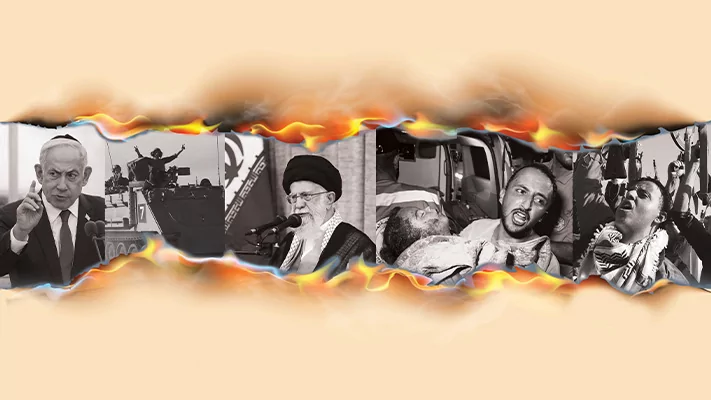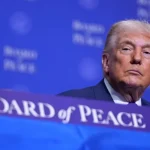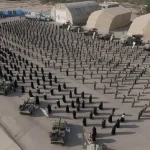

After decades of war, the United States is pivoting away from the Middle East, gearing itself for great power competition with China and Russia. But recent events bring to mind Al Pacino’s famous line from Francis Ford Coppola’s The Godfather Part III: “Just when I thought I was out, they pull me back in.” And they serve as a reminder that Washington should revisit its alliances in the region.
Indeed, the present moment is a good opportunity for the U.S. to reassess. The Middle East is on fire.
The Islamic Republic of Iran is emboldened. Tehran is Beijing’s foremost ally in the region. China views Iran as its regional foil, capable of attacking American allies, disrupting shipping and trade, and thwarting U.S. attempts to increase regional integration and normalization.
On Oct. 7, 2023, Hamas and other Iranian proxies invaded Israel, murdering more than 1,200 people and taking an estimated 240 hostage. The terrorists tortured, raped, and mutilated many of their victims and proudly filmed their atrocities. The attack was the largest massacre of Jewish civilians since the Holocaust. Adjusting for population differences, the massacre was roughly the equivalent of more than 30,000 Americans murdered in one day — more than 10 times the number killed by al Qaeda on 9/11.
The massacre was reportedly planned well in advance, with Hamas and other U.S.-designated terrorist groups receiving extensive training and support from Iran. Indeed, other Iranian proxies, such as Palestinian Islamic Jihad, also took part in the atrocities. Hezbollah, the Iranian-supported terrorist organization that de facto controls Lebanon, began launching attacks from Israel’s north. Other elements of Tehran’s terrorist network, such as the Houthis in Yemen and various militias in Syria and Iraq, have also joined in.
Their objective? To engulf the Jewish state in a “ring of fire,” surrounding it from all sides and subjecting it to a brutal war of attrition. This has long been Iran’s strategy, and several signs indicate that it believes the time is ripe to carry it out. On April 13, Iran fired hundreds of rockets, drones, and missiles at Israel. And for the first time, the barrage came from Iranian soil itself. The fig leaf was off. Tehran was no longer hiding behind its proxies.
Other developments are cause for concern. There is a growing body of evidence suggesting that Iran is edging closer in its ambitions to become a nuclear power. Iranian officials have even bragged that Iran is close to having the bomb.
Writing in the Wall Street Journal, Reuel Marc Gerecht and Ray Takeyh, scholars at the Foundation for Defense of Democracies and the Council on Foreign Relations, recently warned that “Iran’s nuclear calculus has now become more dangerous.” Ayatollah Ali Khamenei, the regime’s supreme leader, is reportedly ailing with cancer — and he could view Iran’s nuclear ambitions as his final legacy. The Middle East, indeed the world, would become even more dangerous if the world’s leading state sponsor of terrorism becomes a nuclear power.
The events of Oct. 7 and the months of war that have followed highlight the declining influence of the U.S. in the Middle East. Indeed, American deterrence has largely collapsed. Long before Hamas invaded Israel, Iranian militias were launching attacks on U.S. forces in Syria and Iraq and the Houthis were attacking ships in the Red Sea.
The Middle East is undergoing another period of dramatic change. China’s involvement in the Middle East is growing, while America’s declines. Iran is gaining ground in its attempt to become the preponderant power in the region. And America’s current security architecture is ill-prepared to meet many of these challenges. The events of the last few months call for a major reassessment.
Several of America’s ostensible allies have revealed themselves to be Janus-faced.
Turkey has been a key American ally for decades. Geopolitics helps explain why. Turkey’s very location, striding between East and West, ensures it will always be an important country. Ankara is the preeminent Mediterranean power and possesses one of the most capable militaries in the Middle East. Belying its geopolitical importance during the Cold War, Turkey became part of not one but two American-backed alliances: NATO and the ill-fated Central Treaty Organization.
Yet it is too easy to view the history of U.S.-Turkey relations with rose-colored glasses. In fact, tensions have always existed. In many respects, they reflect an undeniable fact: Turkey, a key lynchpin in Western alliances, is not itself a Western country. Turkey has long hedged between the Anglosphere and its enemies. The nation was neutral in World War II, and only its historic enmity with Russia made it tilt West during the Cold War.
In recent decades, Turkish power has expanded considerably. Ankara has become increasingly assertive, both in the region and across the globe, reflecting its growing military and economic status from the nadir of decades past. This is hardly unusual. Strong nations tend to flex their muscles.
But Turkey’s dalliances with some of America’s enemies have become more frequent. Cracks in the U.S.-Turkey relationship first appeared in 2003, when the country rejected a proposal to base U.S. troops on Turkish soil during operations against Saddam Hussein’s Iraq. And under President Recep Tayyip Erdogan, Ankara has expanded ties with Islamist movements, including Hamas.
Long before Oct. 7, Erdogan and members of his Justice and Development Party, or AKP, were hosting Hamas. In 2012, for example, Turkey allowed Hamas to establish a headquarters in Istanbul. Hamas has used this haven to plot and carry out hundreds of terrorist attacks, some of which have murdered Americans. The terrorist group also uses Turkey as a key base for intelligence and fundraising. Sinan Ciddi and Jonathan Schanzer, analysts with the Foundation for Defense of Democracies, have noted that Jihad Yaghmour, a convicted Palestinian terrorist, was given sanctuary in Turkey in 2011. Yaghmour helps run the innocuous-sounding “Association of Jerusalem and Our History” — which, after Oct. 7, was renamed “Al Aqsa Flood,” echoing the name that Hamas bestowed upon the massacre.
It is intolerable and unacceptable that Turkey, a NATO member and beneficiary of U.S. largesse, hosts U.S.-designated terrorists like Hamas. But Ankara seems unbothered. On April 20, 2024, Erdogan hosted Hamas political chief Ismail Haniyeh, reportedly as part of talks to get the terrorist group to transfer its main headquarters from Qatar to Turkey.
On the one hand, Turkey could be an important bulwark against both Russian and Iranian influence. And it has been comparatively more critical of China’s treatment of ethnic minorities than any other Muslim-majority nation. Some have argued that it is better to have Turkey on the fence than actively siding with foes like Beijing. Yet the present course is unsustainable.
Both Turkey and Qatar represent two very different cases. Qatar isn’t remotely in the same league as Turkey in terms of its military prowess or geopolitical importance. Rather, Doha’s leverage exists because Washington itself has bestowed it: allowing the Qataris to build a base for U.S. military personnel that they’ve since hung over our heads. But both countries are actively working against U.S. aims and objectives in the Middle East.
Prior to 9/11, the American military presence in the tiny gulf emirate was small, but it has increased dramatically in the last two decades. In March 2022, the Biden administration designated Qatar as a “major non-NATO ally,” significantly expanding ties. In January 2024, the White House also reached a deal extending its military presence at al Udeid Air Base for another 10 years.
But Doha has hosted U.S.-designated terrorist groups, including Hamas and the Taliban. Qatari state media, notably Al Jazeera, are virulently anti-American and antisemitic. This is not a new development. As far back as 2004, then-Secretary of Defense Donald Rumsfeld criticized Al Jazeera for its “vicious, inaccurate, and inexcusable” coverage, including its praise for suicide bombers. More recently, Al Jazeera reporters have even ended interviews with Gazans once they started to complain about Hamas. As the Saudi journalist Matar al Ahmadi, the former editor of Al Arabiya, noted: Al Jazeera is the “channel of [Hezbollah head Hassan] Nasrallah, [Iranian Supreme Leader] Khamenei, and [Osama] bin Laden. … Al Jazeera is nothing but a tool for creating chaos and anarchy … with media and ideological campaigns aimed at marketing Hezbollah” and “al Qaeda.”
Prominent terrorists reside in fancy Doha hotels not too far from American service members living at al Udeid base. Top Hamas operatives, men responsible for the kidnapping and murder of Americans, Israelis, and others, are given sanctuary.
Other alliances present their own problems.
As with Turkey, Egypt is a country that can’t be ignored. For decades, Cairo was the preeminent Arab power in the region. At the dawn of the Cold War, the U.S., cognizant of this fact, cultivated Egypt but initially lost out to the Soviets. Yet beginning with the Nixon administration, U.S.-Egyptian relations improved, eventually leading Washington to bring Cairo successfully “on side.” Egypt not only made peace with Israel but also soon became the beneficiary of significant amounts of U.S. aid. Egypt’s move from the Soviet sphere to the West is one of the great achievements of American foreign policy in the Middle East, and Cairo remains an important U.S. ally. But here, too, there are important problems that need to be addressed.
Israel’s delayed operation into the southern Gaza town of Rafah, Hamas’s last stronghold, has revealed more than 700 tunnel shafts, with at least 50 crossing into Egypt. The existence of the tunnels, used to ferret terrorists and arms and smuggle hostages, including Americans, has long been suspected. Yet the Egyptian government of Abdel Fattah el Sisi has long denied that they still exist, claiming to have destroyed them.
Tellingly, however, Egypt opposed Israel’s Rafah operation, fueling long-standing suspicions that not only was Cairo aware of the tunnels, but it might have even struck deals with Hamas. Sisi came to power thanks to his opposition to the Muslim Brotherhood, which then ruled Egypt. And Hamas itself is an offshoot of the Muslim Brotherhood. Sisi is not a supporter of Islamist groups in the fashion of Turkey or Qatar. But this is still the Middle East, and sometimes it pays to look the other way. Indeed, as Bonnie Glick, a former deputy administrator for the U.S. Agency for International Development, recently observed, Bedouin smugglers with ties to the Sisi regime have made millions from smuggling for Hamas.
Egypt has also steadfastly refused to help solve the humanitarian crisis in Gaza and take in refugees from the war. Egypt’s opposition has made the situation more dire. The Egyptian government’s security concerns are, of course, reasonable. But the tremendous U.S. aid that Egypt receives is partially predicated on Cairo doing its part to prevent the deterioration of security in the region.
Another longtime ally, Jordan, has also hindered recent U.S. objectives.
Jordan has been an important U.S. ally for decades. The ruling Hashemite family, with its origins in the distant Arabian Peninsula, was placed on the throne by the British more than 100 years ago. The Jordanians relied heavily on the British, and later the Americans, for support. The nation itself was carved out of the original British Mandate for Palestine and the majority of its population is Palestinian. These factors have made Hashemite rule inherently fragile. Numerous coups have been attempted, and in 1951, King Abdullah I, the great-grandfather of the current king, was assassinated by Palestinian extremists.
The U.S. and Israel have played an important role in ensuring the Hashemites hold on power, perhaps most notably in 1970 when Palestine Liberation Organization terrorists sought to overthrow the Jordanian ruler, King Hussein. For decades, both Washington and Jerusalem have provided key security assistance to the Kingdom. And Jordan, in turn, has reciprocated by serving American aims and objectives in both the Cold War and the war on terrorism.
Jordan has continued to help, most recently allowing Israeli fighter jets to intercept Iranian missiles being launched at the Jewish state. The Jordanians have assisted both Israel and the U.S. in a multitude of ways, including via sharing key intelligence. Indeed, just by existing and preventing a takeover by extremists, Jordan renders considerable aid to both Washington and Jerusalem, serving as a key lynchpin in America’s Middle East security architecture.
Yet to appease extremist elements in the kingdom, the Jordanians have also thrown gasoline on the fire. Jordan has provided sanctuary to terrorists such as Ahlam Tamimi, the mastermind of the 2001 Sbarro pizza bombing in Israel, which took 17 lives and maimed more than 130 people, including Americans. Tamimi lives a celebrity’s life in Jordan, and the kingdom has refused to extradite her to the U.S. despite her being on the FBI’s Most Wanted list. More recently, Jordan’s Queen Rania has made public remarks blaming Israel for the Oct. 7 massacre and accusing the Jewish state of “genocide.” The Hashemites might be attempting to assuage popular opinion in the kingdom, but in the long run, such efforts are destabilizing.
Jordan, like Egypt, is an important friend to the U.S. And no friendship is without differences. But recent events have highlighted concerns that should be addressed. Ditto for Kuwait, which the U.S. and allies saved from Saddam 30 years ago but which, along with Qatar, recently refused to allow its airspace to be used to counter Iranian attacks. Evidence that Beijing is building bases in the United Arab Emirates, another longtime ally, is also cause for concern.
CLICK HERE TO READ MORE FROM THE WASHINGTON EXAMINER
America’s security alliances in the Middle East are decades old, many born from the Cold War. Attempts to create large collective security alliances a la NATO have had a very checkered history and are inevitably subjected to the storms and chaos that have long plagued the region. The Abraham Accords, in which several Arab states recognized Israel and launched commercial ties with the Jewish state, is the most promising development in years. It is in Washington’s interest to deepen and expand these relations. They represent the best path forward for the U.S. and its friends. Iran, keenly aware of this, will work to destroy them.
As the U.S. pivots to the Pacific, it is tempting to think that the Middle East won’t matter. But the region continues to be an important source for energy, including for American allies in the Indo-Pacific and elsewhere. Yet oil isn’t the greatest export from the Middle East. Instability is. Simply put: The region can’t be written off. And U.S. alliances, like alliances elsewhere, require maintenance. Some, it seems, require revisiting. As Washington looks to craft a new policy for a new age, the status quo will not suffice.
Sean Durns is a senior research analyst for CAMERA, the 65,000-member, Boston-based Committee for Accuracy in Middle East Reporting and Analysis.





